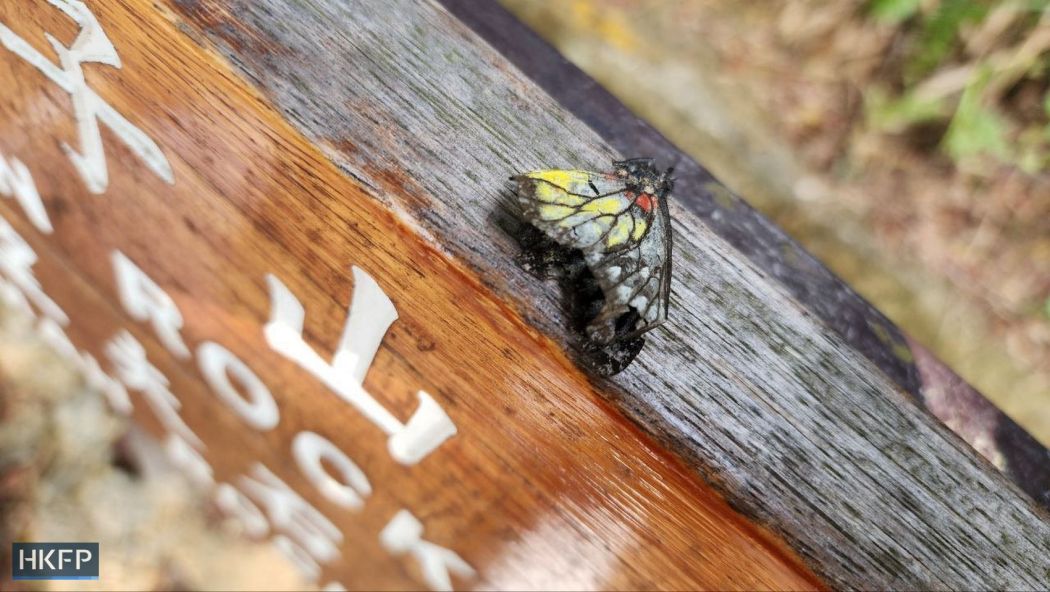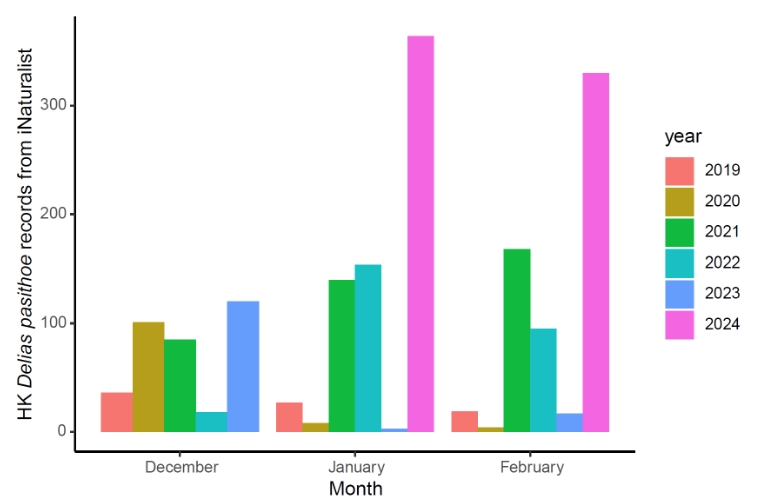An explosion of butterfly sightings in Hong Kong may be linked to the unusually warm winter weather, experts have suggested, with habitat loss also leading to more frequent sightings in the city.
Red-base Jezebel butterflies, or Delias pasithoe, have been spotted – often motionless – around country parks, as well as urban areas, with social media users concerned about a mass “die off.”

Director of the Hong Kong Biodiversity Museum Benoit Guénard told HKFP that butterflies, like all insects, cannot regulate their internal temperatures and rely on the environment to do so. “In the morning they may start flying while being warmed up by a few sunrays, but are then quickly short in energy, allowing them to land whenever they can (often in the shade),” Guénard told HKFP by email on Thursday.
“Many people then think they are dead (or dying) but if you gently pick them up, close your hands and blow hot air in for 10-20 seconds, you will see the butterfly taking off again and flying happily,” he said, adding that many end up being crushed in the process of warming up as people walked by.

Guénard said the adult lifespan of a red-base Jezebel was a few days or weeks, and their population appeared healthy, with eggs, caterpillars and chrysalis easily found.
“[A]lternated periods of cooling and mild weather… may have generated several waves of adult activities during the [dry season],” Guénard said, adding that it was not possible to conclude that the climate crisis was to blame.
Urbanisation threat
Timothy C. Bonebrake – a professor at the University of Hong Kong’s School of Biological Sciences – shared a graph of red-base Jezebel sightings with HKFP, suggesting an “anomaly” this year.
“We have indeed had a warmer than usual winter and my best guess is that the large numbers… we’re seeing are related to this,” he said by email on Thursday.

“[T]hese species are facing an array of challenges to their survival including habitat loss through urbanization and climate change,” he said.
He added that what may be perceived as a “mass die-off,” could also be a case of “mass birthing.”
But Bonebrake also expressed concern over the number of “disoriented” red-base Jezebels seen in the city. “Anytime we see a butterfly on the street, we can categorically define it as
unnatural. This always strikes me; how difficult it can be for animals in Hong Kong to traverse our complex urban landscape,” he said.
“This winter we’re seeing the phenomena at a much higher level and their presence in unfamiliar circumstances should serve as a reminder to everyone that we share this city with a wild and diverse community of plants and animals.”
He said the late boom in numbers could “affect pollination in complicated ways.” Additionally, Bonebrake said a colleague had noted a lower abundance of migrant birds in Hong Kong, which eat the red-base Jezebels.
The Hong Kong Observatory said January saw a monthly mean temperature of 17.9 degrees Celsius – 1.4 degrees above normal, and one of the sixth warmest Januarys on record.
“January 2024 was overall warmer than usual in Hong Kong despite a very cold episode in the latter part of the month,” it said in a February 2 press release.
Support HKFP | Policies & Ethics | Error/typo? | Contact Us | Newsletter | Transparency & Annual Report | Apps
Help safeguard press freedom & keep HKFP free for all readers by supporting our team

LATEST FROM HKFP
HKFP has an impartial stance, transparent funding, and balanced coverage guided by an Ethics Code and Corrections Policy.
Support press freedom & help us surpass 1,000 monthly Patrons: 100% independent, governed by an ethics code & not-for-profit.










